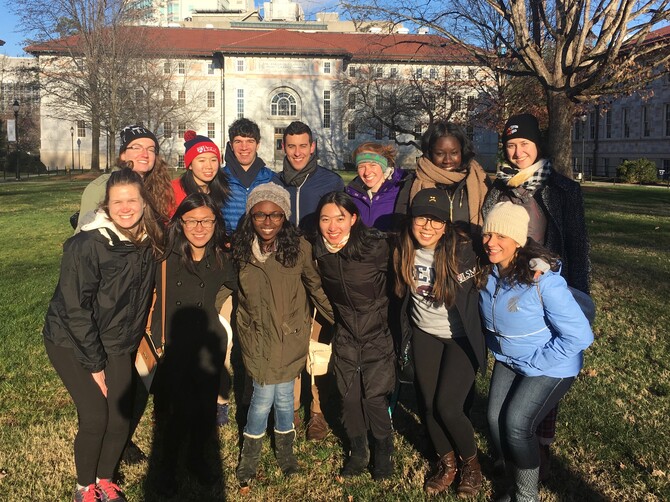Penn Students Engage in Service-learning Projects in Atlanta and Appalachia
People affected by urban and rural poverty, and the complexities of those issues, were the focus for two groups of University of Pennsylvania students during Winter Break service trips.
Organized through Penn’s Civic House, 13 students went to Atlanta to work with a food bank, and 12 went to Harlan, Ky., in Appalachia, to work with an organization addressing the impact of mountaintop-removal mining.
Both groups not only engaged with local people through nonprofit organizations during the first week of January, but they learned by talking together about their experiences to better understand challenges faced by marginalized communities.
“We led discussions about the value of the work we are doing and asked if this is the best way to address the issues,” says senior nursing student Phoebe Hollyer, one of leaders on the Atlanta trip.
“It’s a lot to take in,” says senior computer science major Rachel Adducci, one of the leaders on the Kentucky trip. “We try to get people to focus on what they are seeing by having conversations and reflecting on our experiences with one another.”
The students in Kentucky toured a coal-mining museum and talked with people about how changes in the coal industry and mining practices have impacted their lives and the town. Primarily, they worked with a community organizer to build dog houses from recycled materials and to distribute them. The dog houses are offered to community members in an effort to connect with people while also helping their pets.
“We did a lot of things revolving around giving out the dog houses,” says Adducci, who is from La Grange, Ill., noting that the community is impoverished, even though the area is rich in natural resources.
In Georgia, students worked in a food pantry associated with the nonprofit Atlanta Community Food Bank. They joined other volunteers to help cook and serve meals, as well as sort and organize donated clothing. They salvaged, sorted and re-packaged food donations in the Food Bank warehouse. They stocked shelves in the food pantry and also took clients shopping for food there.
On the warehouse day, they received a progress report: a shift of volunteers repackaged 17,000 pounds of food, which translated into 14,400 meals.
“While we were inspired to hear these numbers, we also reflected that hunger is so much more complicated than that,” says Hollyer, who is from Wallingford, Pa. “Working in food bank and food pantry addresses the symptoms of the issue but not some of the systemic causes of hunger.”
The Atlanta group discussed how “dehumanizing” a food pantry experience can be for the patrons, and how to change that through “radical hospitality,” says senior leader Jialin Zhang of Miami, a life sciences management major.
“I loved the food pantry day, when we got to meet the folks who were receiving the food.”
Trying to understand how complex issues like hunger and poverty are intertwined is a goal of Civic House, says associate director Megan Forman.
“Something that is important to us is that students begin to realize that social-justice issues don’t operate in their own bubbles,” Forman says. “Through this experiential learning model, we want students to begin to realize that issues like inequities in education and the prevalence of urban poverty are not separate issues but are actually very much interrelated.”
Serving the communities for a week is important, but the trips are “not just about the service,” Forman says. “We want to make sure that we are helping the students to grow and learn and develop in all sorts of ways from that experience as well.”
Seniors Grant Kleiser, from New York City, and Abbie Starker, from Abington, Pa., are student co-directors of the Alternate Spring Break program, responsible for organizing and planning the trips, which include two for Winter Break, and seven for Spring Break.
Penn students apply to go on the trips, and pay $400-500, which includes their transportation, food and activity costs. Students are able to apply for financial aid for their trips as well. This year, the organization awarded close to $10,000 in financial aid.
Kleiser and Starker lead a student board that handles fundraising, outreach and education, while also holding meetings with student trip leaders and working with Forman on tasks such as transportation logistics and payments. They both have been on alternate break trips previously.
“I was able to educate myself on issues,” Keiser says, “that I couldn’t imagine doing in classroom, meeting people different than myself and hearing their stories. It was very rewarding.”
Another Civic House goal is to connect Penn students with each other.
“We intentionally make the groups very diverse so people are oftentimes meeting other students they would have maybe otherwise never interacted with on campus,” Forman says.
“We lived together for a week, like a big sleepover,” says Hollyer, who had been on two previous alternate break trips. “It’s a lot of service and learning, but it is also a lot of fun. The shared experience builds community.”
Some people stay connected with Civic House even after graduation. In Atlanta the group had dinner with Amit Pujari, who graduated from Penn in 2015. The participants in this year’s trips say they came away with lifelong lessons and friends.
Zhang said she is going to be more cognizant of food waste and nutrition, particularly since she may go into the health-care or pharmaceutical business. Adducci said the trip reaffirmed her commitment to social-justice issues.
“Going on these trips inspires me to continue work like this the rest of my life, volunteering,” Hollyer says. “It’s fun, and it forces you to think beyond yourself.”








